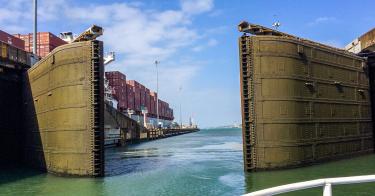The Panama Canal, built by the United States more than a century ago, has long been a linchpin of projecting influence and defending America’s interests in the Western Hemisphere. Now, the People’s Republic of China has its eyes on undermining the U.S.-Panama relationship. Beijing’s chosen weapon for that assault is the “debt-trap diplomacy” of its Belt and Road Initiative (BRI).
The BRI is a top priority of Chinese Communist Party Secretary-General Xi Jinping, who designed it to extend Chinese influence around the world. The Oxford Business Group reports BRI projects are currently underway in 18 Latin American and Caribbean countries. And Panama has been a focal point of that activity.
In 2018, Panama became the first Latin American country to sign a BRI compact. Even before that, as far back as the 1990s, China had begun positioning itself at either end of the Panama Canal by winning contracts to establish container ports run by Chinese state-owned companies.
Recently, China has strengthened its presence in the country by beginning construction of a fourth, $1.42 billion bridge over the canal. Funded by BRI, the work is being done by Chinese state-owned companies.
A recent report from the Foundation for the Defense of Democracies noted, “China is not only exporting steel and concrete [through BRI projects], but also corruption, opacity, and waste. These features are not incidental side effects of working in countries where graft is already endemic, but rather an upside for China.”
The global pandemic and recession has left Panama in a particularly vulnerable condition. Earlier this year, Panama Canal Administrator Ricaurte Vasquez told Boston’s NPR station WBUR that the pandemic had caused “a very significant decline” of shipping through the canal. Far fewer cruise ships and ships loaded with automobiles and parts are making the transit. Moreover, the post-pandemic “new normal” is likely to cause permanent changes in world trading patterns that will reduce the canal’s revenues.
According to the Minneapolis Star Tribune, Panamanian President Laurentino Cortizo of the leftist Revolutionary Democratic Party (PRD) has faced an upsurge in coronavirus cases as his government seeks to re-open the services-based economy.
Prior to the pandemic, GDP growth had been solid for five straight years due to Panama’s role as a logistics and financial hub and to the country’s steady gains in economic freedom. The 2020 Index of Economic Freedom ranked Panama as the 55th freest economy in the world, up 16 places since 2013 and above the regional and world averages.
If it is going to reestablish rapid economic growth and fend off growing Chinese influence, the country will need to do even better. When he took office in 2019, Mr. Cortizo pledged to tackle institutional weaknesses, fight corruption, and address government integrity. Index scores in those three areas are among the country’s lowest. In general, weak rule of law is the biggest obstacle to greater economic freedom in Panama.
Any move by China to exploit Panama’s current economic downturn and its weak underbelly of corruption poses a threat not just to Panama, but also to all countries that depend on open access to the canal. The best inoculation against such predatory behavior is to strengthen democracy and economic freedom.
Mr. Cortizo has said the right things. Now it is up to him and his government to deliver the policies that will strengthen the rule of law and put Panama solidly on the path to economic recovery and even greater political and economic freedom.
This piece originally appeared in The Washington Times



